Restorative Justice: Principles and Practice
VerifiedAdded on 2020/06/04
|12
|2433
|353
AI Summary
This assignment explores the concept of restorative justice, examining its core principles, various implementation models, and effectiveness in addressing juvenile offenses. It delves into research findings regarding victims' experiences within restorative justice programs and analyzes the impact on recidivism rates. Furthermore, the assignment considers the ethical implications and challenges associated with restorative justice, highlighting its potential benefits for both offenders and victims.
Contribute Materials
Your contribution can guide someone’s learning journey. Share your
documents today.

Research Proposal
Secure Best Marks with AI Grader
Need help grading? Try our AI Grader for instant feedback on your assignments.
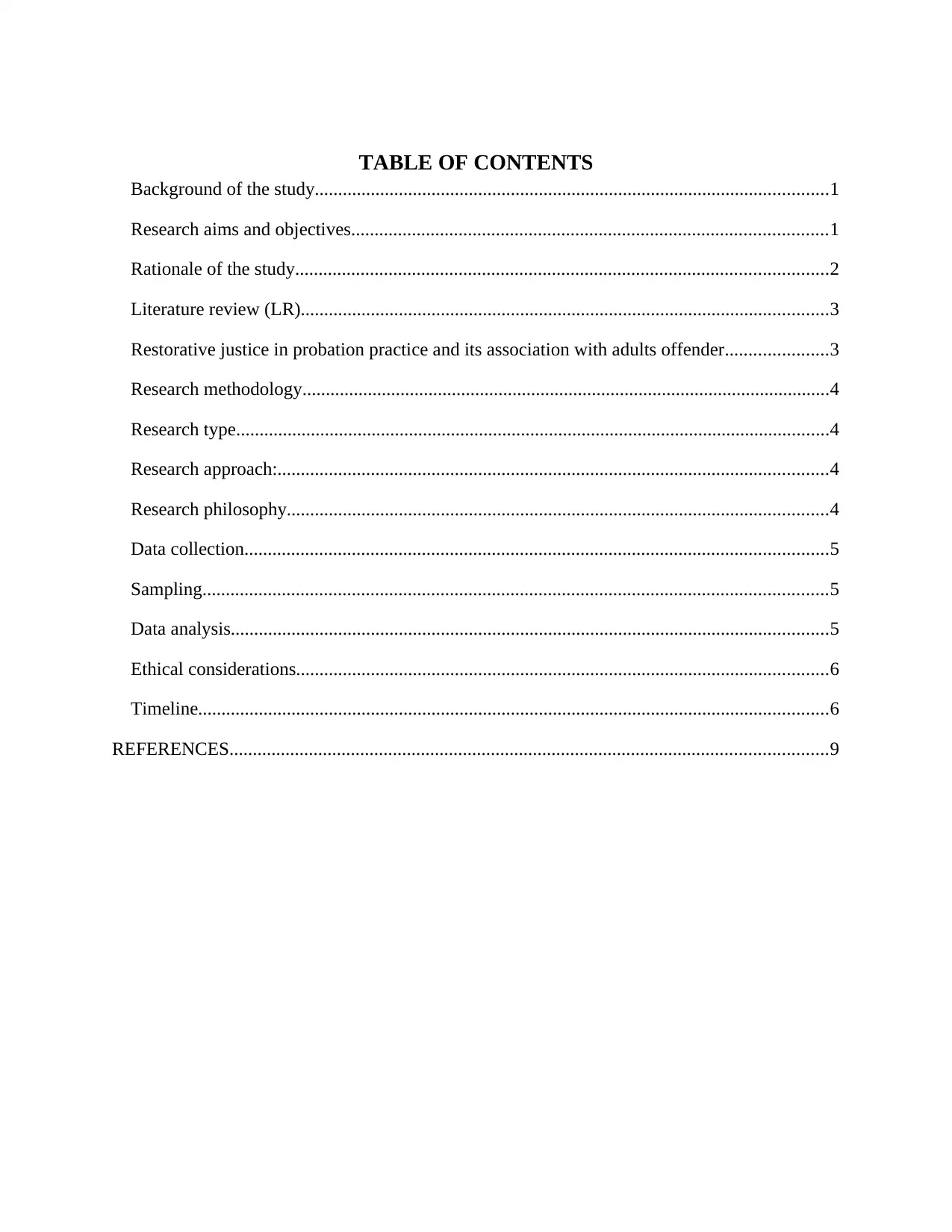
TABLE OF CONTENTS
Background of the study..............................................................................................................1
Research aims and objectives......................................................................................................1
Rationale of the study..................................................................................................................2
Literature review (LR).................................................................................................................3
Restorative justice in probation practice and its association with adults offender......................3
Research methodology.................................................................................................................4
Research type...............................................................................................................................4
Research approach:......................................................................................................................4
Research philosophy....................................................................................................................4
Data collection.............................................................................................................................5
Sampling......................................................................................................................................5
Data analysis................................................................................................................................5
Ethical considerations..................................................................................................................6
Timeline.......................................................................................................................................6
REFERENCES................................................................................................................................9
Background of the study..............................................................................................................1
Research aims and objectives......................................................................................................1
Rationale of the study..................................................................................................................2
Literature review (LR).................................................................................................................3
Restorative justice in probation practice and its association with adults offender......................3
Research methodology.................................................................................................................4
Research type...............................................................................................................................4
Research approach:......................................................................................................................4
Research philosophy....................................................................................................................4
Data collection.............................................................................................................................5
Sampling......................................................................................................................................5
Data analysis................................................................................................................................5
Ethical considerations..................................................................................................................6
Timeline.......................................................................................................................................6
REFERENCES................................................................................................................................9
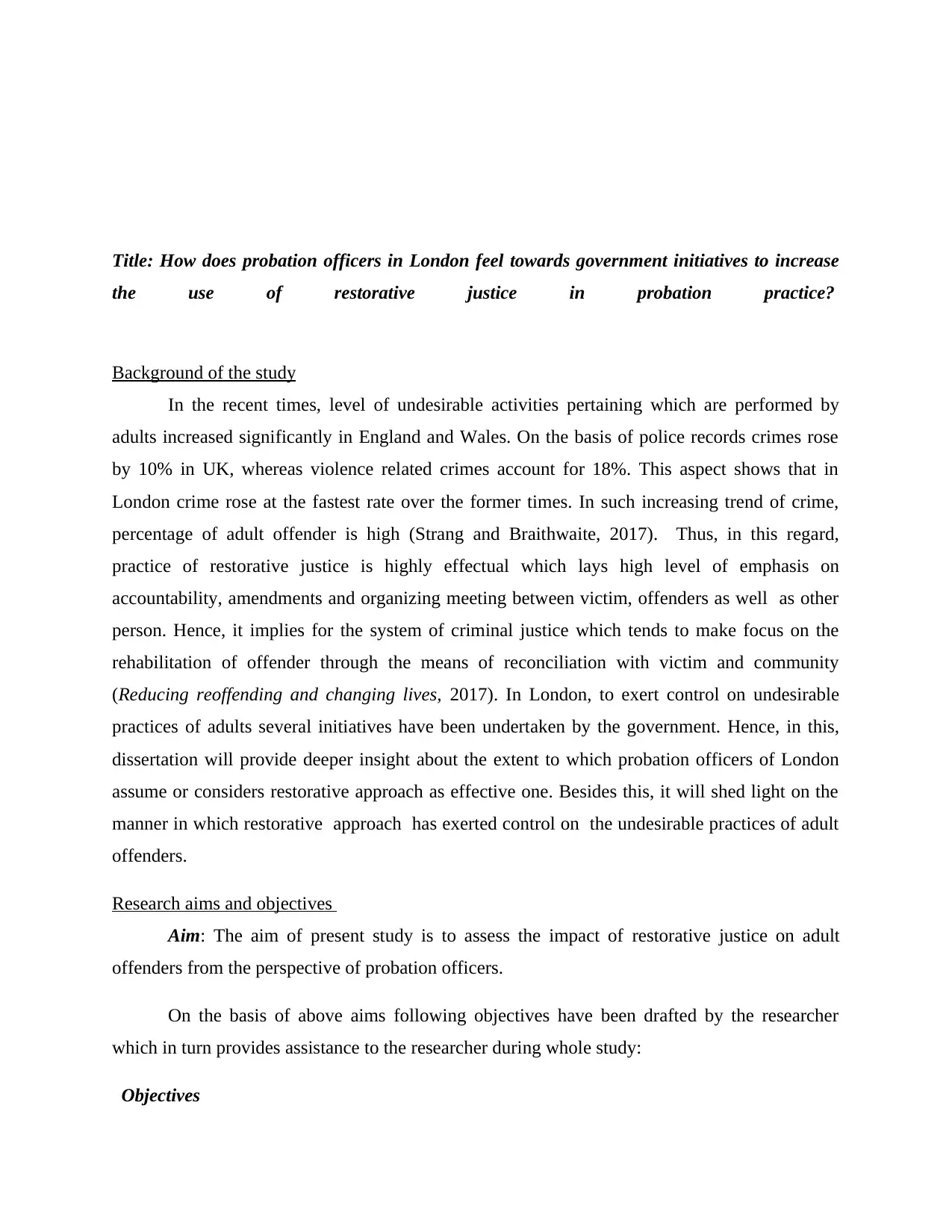
Title: How does probation officers in London feel towards government initiatives to increase
the use of restorative justice in probation practice?
Background of the study
In the recent times, level of undesirable activities pertaining which are performed by
adults increased significantly in England and Wales. On the basis of police records crimes rose
by 10% in UK, whereas violence related crimes account for 18%. This aspect shows that in
London crime rose at the fastest rate over the former times. In such increasing trend of crime,
percentage of adult offender is high (Strang and Braithwaite, 2017). Thus, in this regard,
practice of restorative justice is highly effectual which lays high level of emphasis on
accountability, amendments and organizing meeting between victim, offenders as well as other
person. Hence, it implies for the system of criminal justice which tends to make focus on the
rehabilitation of offender through the means of reconciliation with victim and community
(Reducing reoffending and changing lives, 2017). In London, to exert control on undesirable
practices of adults several initiatives have been undertaken by the government. Hence, in this,
dissertation will provide deeper insight about the extent to which probation officers of London
assume or considers restorative approach as effective one. Besides this, it will shed light on the
manner in which restorative approach has exerted control on the undesirable practices of adult
offenders.
Research aims and objectives
Aim: The aim of present study is to assess the impact of restorative justice on adult
offenders from the perspective of probation officers.
On the basis of above aims following objectives have been drafted by the researcher
which in turn provides assistance to the researcher during whole study:
Objectives
the use of restorative justice in probation practice?
Background of the study
In the recent times, level of undesirable activities pertaining which are performed by
adults increased significantly in England and Wales. On the basis of police records crimes rose
by 10% in UK, whereas violence related crimes account for 18%. This aspect shows that in
London crime rose at the fastest rate over the former times. In such increasing trend of crime,
percentage of adult offender is high (Strang and Braithwaite, 2017). Thus, in this regard,
practice of restorative justice is highly effectual which lays high level of emphasis on
accountability, amendments and organizing meeting between victim, offenders as well as other
person. Hence, it implies for the system of criminal justice which tends to make focus on the
rehabilitation of offender through the means of reconciliation with victim and community
(Reducing reoffending and changing lives, 2017). In London, to exert control on undesirable
practices of adults several initiatives have been undertaken by the government. Hence, in this,
dissertation will provide deeper insight about the extent to which probation officers of London
assume or considers restorative approach as effective one. Besides this, it will shed light on the
manner in which restorative approach has exerted control on the undesirable practices of adult
offenders.
Research aims and objectives
Aim: The aim of present study is to assess the impact of restorative justice on adult
offenders from the perspective of probation officers.
On the basis of above aims following objectives have been drafted by the researcher
which in turn provides assistance to the researcher during whole study:
Objectives
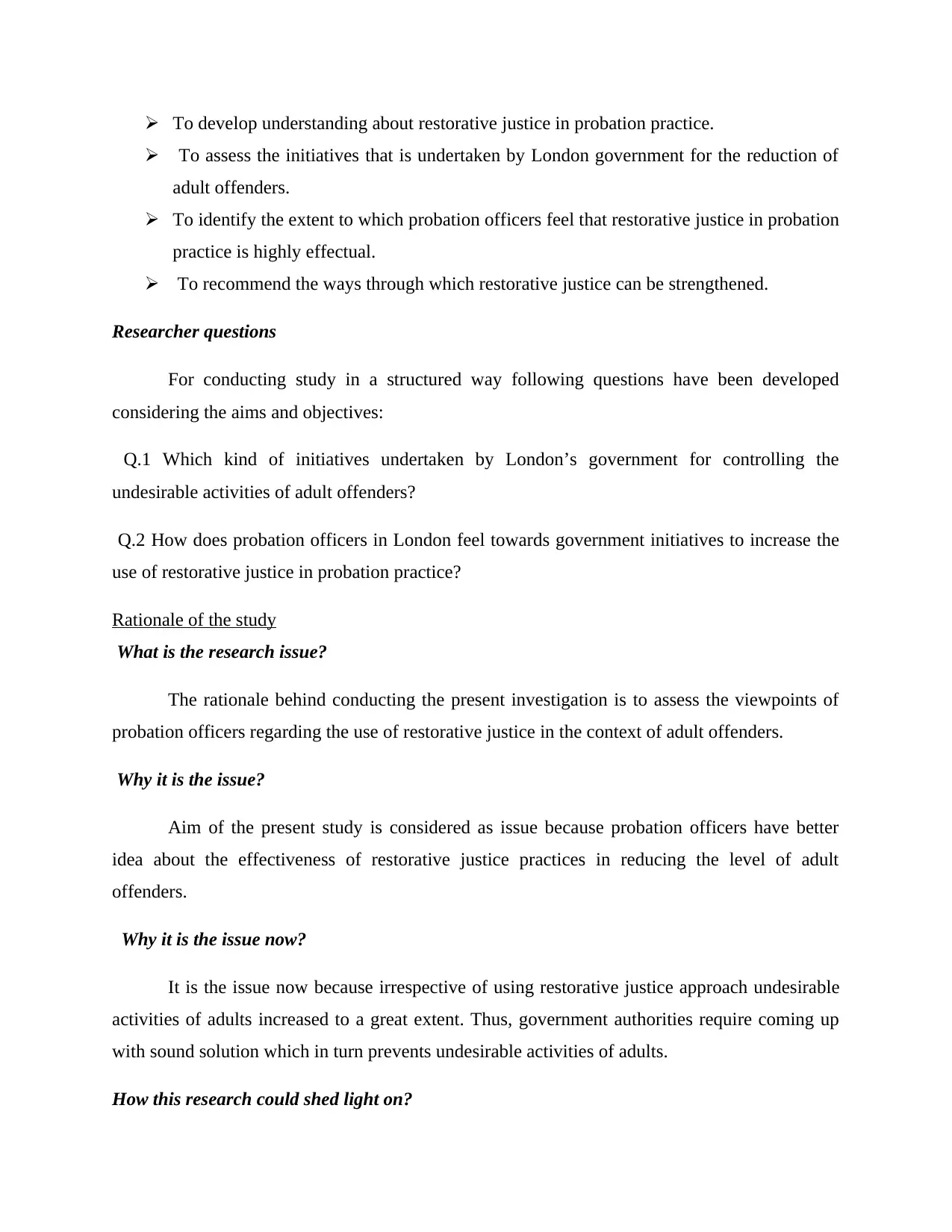
To develop understanding about restorative justice in probation practice.
To assess the initiatives that is undertaken by London government for the reduction of
adult offenders.
To identify the extent to which probation officers feel that restorative justice in probation
practice is highly effectual.
To recommend the ways through which restorative justice can be strengthened.
Researcher questions
For conducting study in a structured way following questions have been developed
considering the aims and objectives:
Q.1 Which kind of initiatives undertaken by London’s government for controlling the
undesirable activities of adult offenders?
Q.2 How does probation officers in London feel towards government initiatives to increase the
use of restorative justice in probation practice?
Rationale of the study
What is the research issue?
The rationale behind conducting the present investigation is to assess the viewpoints of
probation officers regarding the use of restorative justice in the context of adult offenders.
Why it is the issue?
Aim of the present study is considered as issue because probation officers have better
idea about the effectiveness of restorative justice practices in reducing the level of adult
offenders.
Why it is the issue now?
It is the issue now because irrespective of using restorative justice approach undesirable
activities of adults increased to a great extent. Thus, government authorities require coming up
with sound solution which in turn prevents undesirable activities of adults.
How this research could shed light on?
To assess the initiatives that is undertaken by London government for the reduction of
adult offenders.
To identify the extent to which probation officers feel that restorative justice in probation
practice is highly effectual.
To recommend the ways through which restorative justice can be strengthened.
Researcher questions
For conducting study in a structured way following questions have been developed
considering the aims and objectives:
Q.1 Which kind of initiatives undertaken by London’s government for controlling the
undesirable activities of adult offenders?
Q.2 How does probation officers in London feel towards government initiatives to increase the
use of restorative justice in probation practice?
Rationale of the study
What is the research issue?
The rationale behind conducting the present investigation is to assess the viewpoints of
probation officers regarding the use of restorative justice in the context of adult offenders.
Why it is the issue?
Aim of the present study is considered as issue because probation officers have better
idea about the effectiveness of restorative justice practices in reducing the level of adult
offenders.
Why it is the issue now?
It is the issue now because irrespective of using restorative justice approach undesirable
activities of adults increased to a great extent. Thus, government authorities require coming up
with sound solution which in turn prevents undesirable activities of adults.
How this research could shed light on?
Secure Best Marks with AI Grader
Need help grading? Try our AI Grader for instant feedback on your assignments.
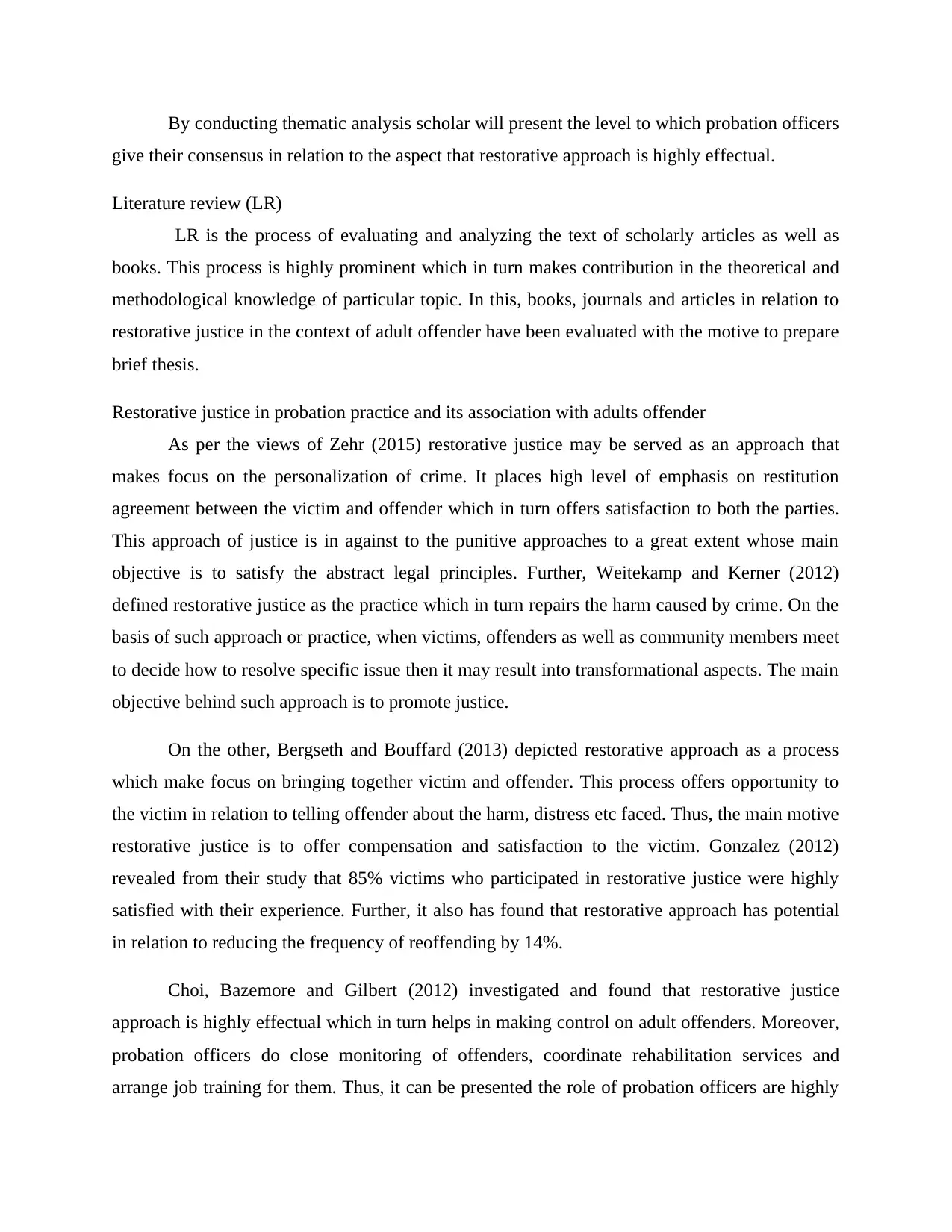
By conducting thematic analysis scholar will present the level to which probation officers
give their consensus in relation to the aspect that restorative approach is highly effectual.
Literature review (LR)
LR is the process of evaluating and analyzing the text of scholarly articles as well as
books. This process is highly prominent which in turn makes contribution in the theoretical and
methodological knowledge of particular topic. In this, books, journals and articles in relation to
restorative justice in the context of adult offender have been evaluated with the motive to prepare
brief thesis.
Restorative justice in probation practice and its association with adults offender
As per the views of Zehr (2015) restorative justice may be served as an approach that
makes focus on the personalization of crime. It places high level of emphasis on restitution
agreement between the victim and offender which in turn offers satisfaction to both the parties.
This approach of justice is in against to the punitive approaches to a great extent whose main
objective is to satisfy the abstract legal principles. Further, Weitekamp and Kerner (2012)
defined restorative justice as the practice which in turn repairs the harm caused by crime. On the
basis of such approach or practice, when victims, offenders as well as community members meet
to decide how to resolve specific issue then it may result into transformational aspects. The main
objective behind such approach is to promote justice.
On the other, Bergseth and Bouffard (2013) depicted restorative approach as a process
which make focus on bringing together victim and offender. This process offers opportunity to
the victim in relation to telling offender about the harm, distress etc faced. Thus, the main motive
restorative justice is to offer compensation and satisfaction to the victim. Gonzalez (2012)
revealed from their study that 85% victims who participated in restorative justice were highly
satisfied with their experience. Further, it also has found that restorative approach has potential
in relation to reducing the frequency of reoffending by 14%.
Choi, Bazemore and Gilbert (2012) investigated and found that restorative justice
approach is highly effectual which in turn helps in making control on adult offenders. Moreover,
probation officers do close monitoring of offenders, coordinate rehabilitation services and
arrange job training for them. Thus, it can be presented the role of probation officers are highly
give their consensus in relation to the aspect that restorative approach is highly effectual.
Literature review (LR)
LR is the process of evaluating and analyzing the text of scholarly articles as well as
books. This process is highly prominent which in turn makes contribution in the theoretical and
methodological knowledge of particular topic. In this, books, journals and articles in relation to
restorative justice in the context of adult offender have been evaluated with the motive to prepare
brief thesis.
Restorative justice in probation practice and its association with adults offender
As per the views of Zehr (2015) restorative justice may be served as an approach that
makes focus on the personalization of crime. It places high level of emphasis on restitution
agreement between the victim and offender which in turn offers satisfaction to both the parties.
This approach of justice is in against to the punitive approaches to a great extent whose main
objective is to satisfy the abstract legal principles. Further, Weitekamp and Kerner (2012)
defined restorative justice as the practice which in turn repairs the harm caused by crime. On the
basis of such approach or practice, when victims, offenders as well as community members meet
to decide how to resolve specific issue then it may result into transformational aspects. The main
objective behind such approach is to promote justice.
On the other, Bergseth and Bouffard (2013) depicted restorative approach as a process
which make focus on bringing together victim and offender. This process offers opportunity to
the victim in relation to telling offender about the harm, distress etc faced. Thus, the main motive
restorative justice is to offer compensation and satisfaction to the victim. Gonzalez (2012)
revealed from their study that 85% victims who participated in restorative justice were highly
satisfied with their experience. Further, it also has found that restorative approach has potential
in relation to reducing the frequency of reoffending by 14%.
Choi, Bazemore and Gilbert (2012) investigated and found that restorative justice
approach is highly effectual which in turn helps in making control on adult offenders. Moreover,
probation officers do close monitoring of offenders, coordinate rehabilitation services and
arrange job training for them. Thus, it can be presented the role of probation officers are highly
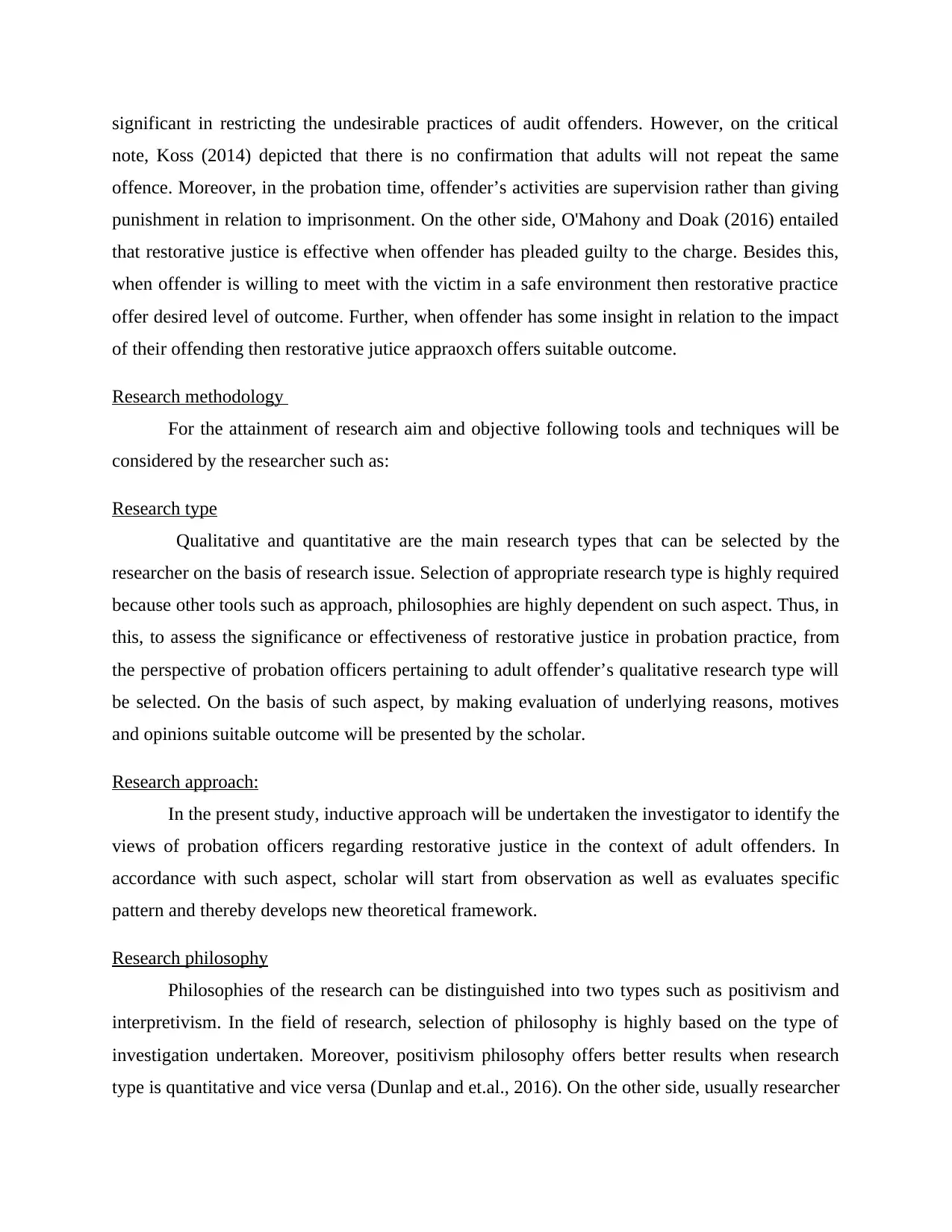
significant in restricting the undesirable practices of audit offenders. However, on the critical
note, Koss (2014) depicted that there is no confirmation that adults will not repeat the same
offence. Moreover, in the probation time, offender’s activities are supervision rather than giving
punishment in relation to imprisonment. On the other side, O'Mahony and Doak (2016) entailed
that restorative justice is effective when offender has pleaded guilty to the charge. Besides this,
when offender is willing to meet with the victim in a safe environment then restorative practice
offer desired level of outcome. Further, when offender has some insight in relation to the impact
of their offending then restorative jutice appraoxch offers suitable outcome.
Research methodology
For the attainment of research aim and objective following tools and techniques will be
considered by the researcher such as:
Research type
Qualitative and quantitative are the main research types that can be selected by the
researcher on the basis of research issue. Selection of appropriate research type is highly required
because other tools such as approach, philosophies are highly dependent on such aspect. Thus, in
this, to assess the significance or effectiveness of restorative justice in probation practice, from
the perspective of probation officers pertaining to adult offender’s qualitative research type will
be selected. On the basis of such aspect, by making evaluation of underlying reasons, motives
and opinions suitable outcome will be presented by the scholar.
Research approach:
In the present study, inductive approach will be undertaken the investigator to identify the
views of probation officers regarding restorative justice in the context of adult offenders. In
accordance with such aspect, scholar will start from observation as well as evaluates specific
pattern and thereby develops new theoretical framework.
Research philosophy
Philosophies of the research can be distinguished into two types such as positivism and
interpretivism. In the field of research, selection of philosophy is highly based on the type of
investigation undertaken. Moreover, positivism philosophy offers better results when research
type is quantitative and vice versa (Dunlap and et.al., 2016). On the other side, usually researcher
note, Koss (2014) depicted that there is no confirmation that adults will not repeat the same
offence. Moreover, in the probation time, offender’s activities are supervision rather than giving
punishment in relation to imprisonment. On the other side, O'Mahony and Doak (2016) entailed
that restorative justice is effective when offender has pleaded guilty to the charge. Besides this,
when offender is willing to meet with the victim in a safe environment then restorative practice
offer desired level of outcome. Further, when offender has some insight in relation to the impact
of their offending then restorative jutice appraoxch offers suitable outcome.
Research methodology
For the attainment of research aim and objective following tools and techniques will be
considered by the researcher such as:
Research type
Qualitative and quantitative are the main research types that can be selected by the
researcher on the basis of research issue. Selection of appropriate research type is highly required
because other tools such as approach, philosophies are highly dependent on such aspect. Thus, in
this, to assess the significance or effectiveness of restorative justice in probation practice, from
the perspective of probation officers pertaining to adult offender’s qualitative research type will
be selected. On the basis of such aspect, by making evaluation of underlying reasons, motives
and opinions suitable outcome will be presented by the scholar.
Research approach:
In the present study, inductive approach will be undertaken the investigator to identify the
views of probation officers regarding restorative justice in the context of adult offenders. In
accordance with such aspect, scholar will start from observation as well as evaluates specific
pattern and thereby develops new theoretical framework.
Research philosophy
Philosophies of the research can be distinguished into two types such as positivism and
interpretivism. In the field of research, selection of philosophy is highly based on the type of
investigation undertaken. Moreover, positivism philosophy offers better results when research
type is quantitative and vice versa (Dunlap and et.al., 2016). On the other side, usually researcher
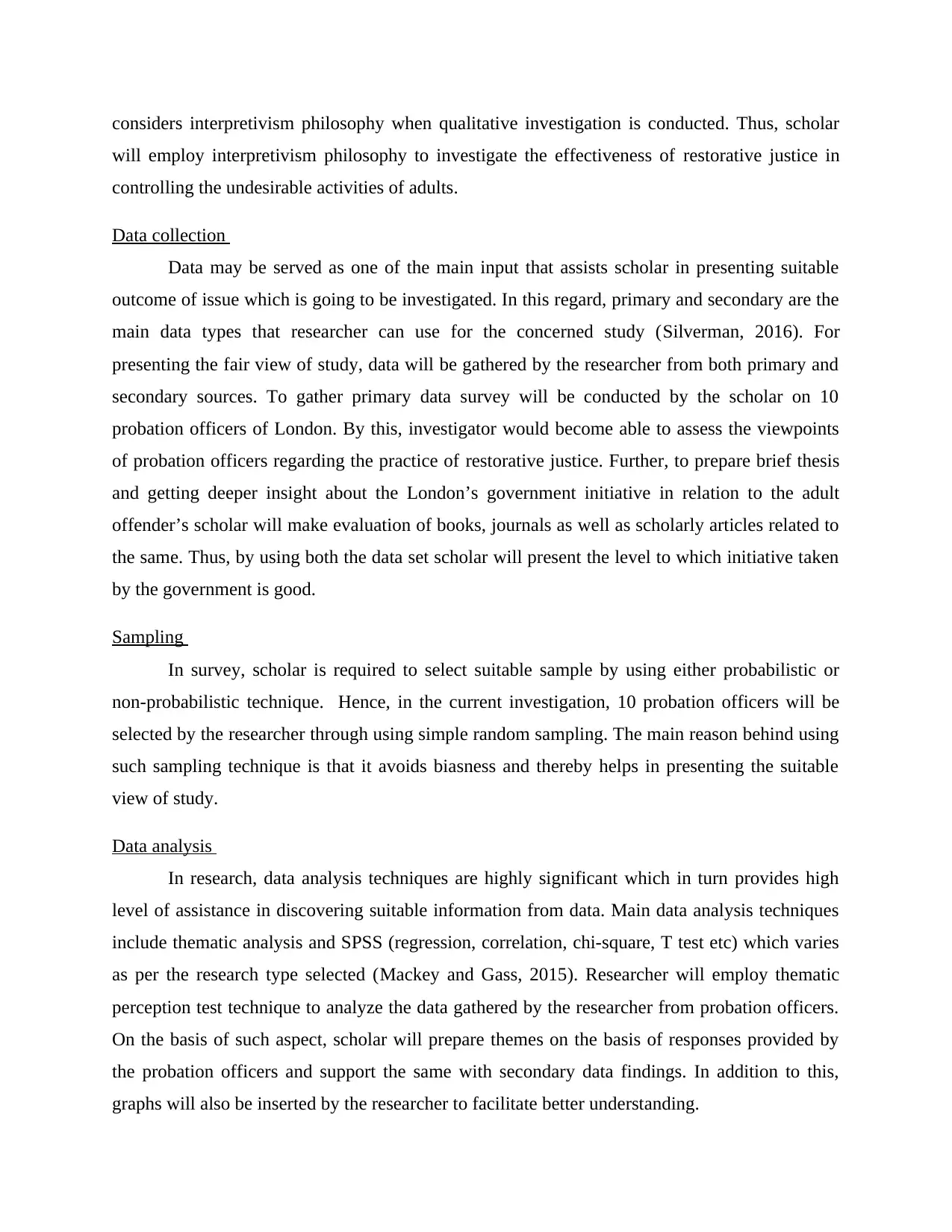
considers interpretivism philosophy when qualitative investigation is conducted. Thus, scholar
will employ interpretivism philosophy to investigate the effectiveness of restorative justice in
controlling the undesirable activities of adults.
Data collection
Data may be served as one of the main input that assists scholar in presenting suitable
outcome of issue which is going to be investigated. In this regard, primary and secondary are the
main data types that researcher can use for the concerned study (Silverman, 2016). For
presenting the fair view of study, data will be gathered by the researcher from both primary and
secondary sources. To gather primary data survey will be conducted by the scholar on 10
probation officers of London. By this, investigator would become able to assess the viewpoints
of probation officers regarding the practice of restorative justice. Further, to prepare brief thesis
and getting deeper insight about the London’s government initiative in relation to the adult
offender’s scholar will make evaluation of books, journals as well as scholarly articles related to
the same. Thus, by using both the data set scholar will present the level to which initiative taken
by the government is good.
Sampling
In survey, scholar is required to select suitable sample by using either probabilistic or
non-probabilistic technique. Hence, in the current investigation, 10 probation officers will be
selected by the researcher through using simple random sampling. The main reason behind using
such sampling technique is that it avoids biasness and thereby helps in presenting the suitable
view of study.
Data analysis
In research, data analysis techniques are highly significant which in turn provides high
level of assistance in discovering suitable information from data. Main data analysis techniques
include thematic analysis and SPSS (regression, correlation, chi-square, T test etc) which varies
as per the research type selected (Mackey and Gass, 2015). Researcher will employ thematic
perception test technique to analyze the data gathered by the researcher from probation officers.
On the basis of such aspect, scholar will prepare themes on the basis of responses provided by
the probation officers and support the same with secondary data findings. In addition to this,
graphs will also be inserted by the researcher to facilitate better understanding.
will employ interpretivism philosophy to investigate the effectiveness of restorative justice in
controlling the undesirable activities of adults.
Data collection
Data may be served as one of the main input that assists scholar in presenting suitable
outcome of issue which is going to be investigated. In this regard, primary and secondary are the
main data types that researcher can use for the concerned study (Silverman, 2016). For
presenting the fair view of study, data will be gathered by the researcher from both primary and
secondary sources. To gather primary data survey will be conducted by the scholar on 10
probation officers of London. By this, investigator would become able to assess the viewpoints
of probation officers regarding the practice of restorative justice. Further, to prepare brief thesis
and getting deeper insight about the London’s government initiative in relation to the adult
offender’s scholar will make evaluation of books, journals as well as scholarly articles related to
the same. Thus, by using both the data set scholar will present the level to which initiative taken
by the government is good.
Sampling
In survey, scholar is required to select suitable sample by using either probabilistic or
non-probabilistic technique. Hence, in the current investigation, 10 probation officers will be
selected by the researcher through using simple random sampling. The main reason behind using
such sampling technique is that it avoids biasness and thereby helps in presenting the suitable
view of study.
Data analysis
In research, data analysis techniques are highly significant which in turn provides high
level of assistance in discovering suitable information from data. Main data analysis techniques
include thematic analysis and SPSS (regression, correlation, chi-square, T test etc) which varies
as per the research type selected (Mackey and Gass, 2015). Researcher will employ thematic
perception test technique to analyze the data gathered by the researcher from probation officers.
On the basis of such aspect, scholar will prepare themes on the basis of responses provided by
the probation officers and support the same with secondary data findings. In addition to this,
graphs will also be inserted by the researcher to facilitate better understanding.
Paraphrase This Document
Need a fresh take? Get an instant paraphrase of this document with our AI Paraphraser
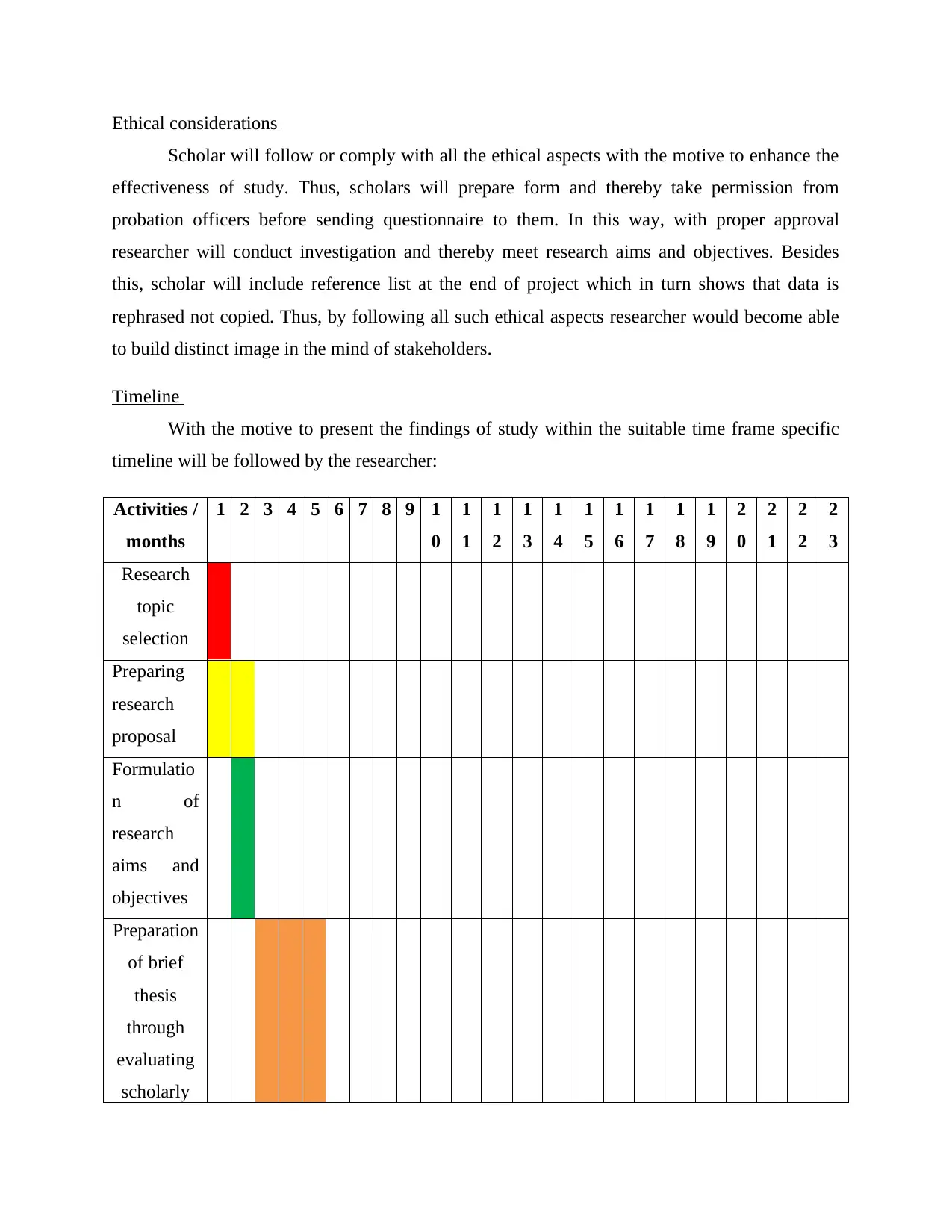
Ethical considerations
Scholar will follow or comply with all the ethical aspects with the motive to enhance the
effectiveness of study. Thus, scholars will prepare form and thereby take permission from
probation officers before sending questionnaire to them. In this way, with proper approval
researcher will conduct investigation and thereby meet research aims and objectives. Besides
this, scholar will include reference list at the end of project which in turn shows that data is
rephrased not copied. Thus, by following all such ethical aspects researcher would become able
to build distinct image in the mind of stakeholders.
Timeline
With the motive to present the findings of study within the suitable time frame specific
timeline will be followed by the researcher:
Activities /
months
1 2 3 4 5 6 7 8 9 1
0
1
1
1
2
1
3
1
4
1
5
1
6
1
7
1
8
1
9
2
0
2
1
2
2
2
3
Research
topic
selection
Preparing
research
proposal
Formulatio
n of
research
aims and
objectives
Preparation
of brief
thesis
through
evaluating
scholarly
Scholar will follow or comply with all the ethical aspects with the motive to enhance the
effectiveness of study. Thus, scholars will prepare form and thereby take permission from
probation officers before sending questionnaire to them. In this way, with proper approval
researcher will conduct investigation and thereby meet research aims and objectives. Besides
this, scholar will include reference list at the end of project which in turn shows that data is
rephrased not copied. Thus, by following all such ethical aspects researcher would become able
to build distinct image in the mind of stakeholders.
Timeline
With the motive to present the findings of study within the suitable time frame specific
timeline will be followed by the researcher:
Activities /
months
1 2 3 4 5 6 7 8 9 1
0
1
1
1
2
1
3
1
4
1
5
1
6
1
7
1
8
1
9
2
0
2
1
2
2
2
3
Research
topic
selection
Preparing
research
proposal
Formulatio
n of
research
aims and
objectives
Preparation
of brief
thesis
through
evaluating
scholarly
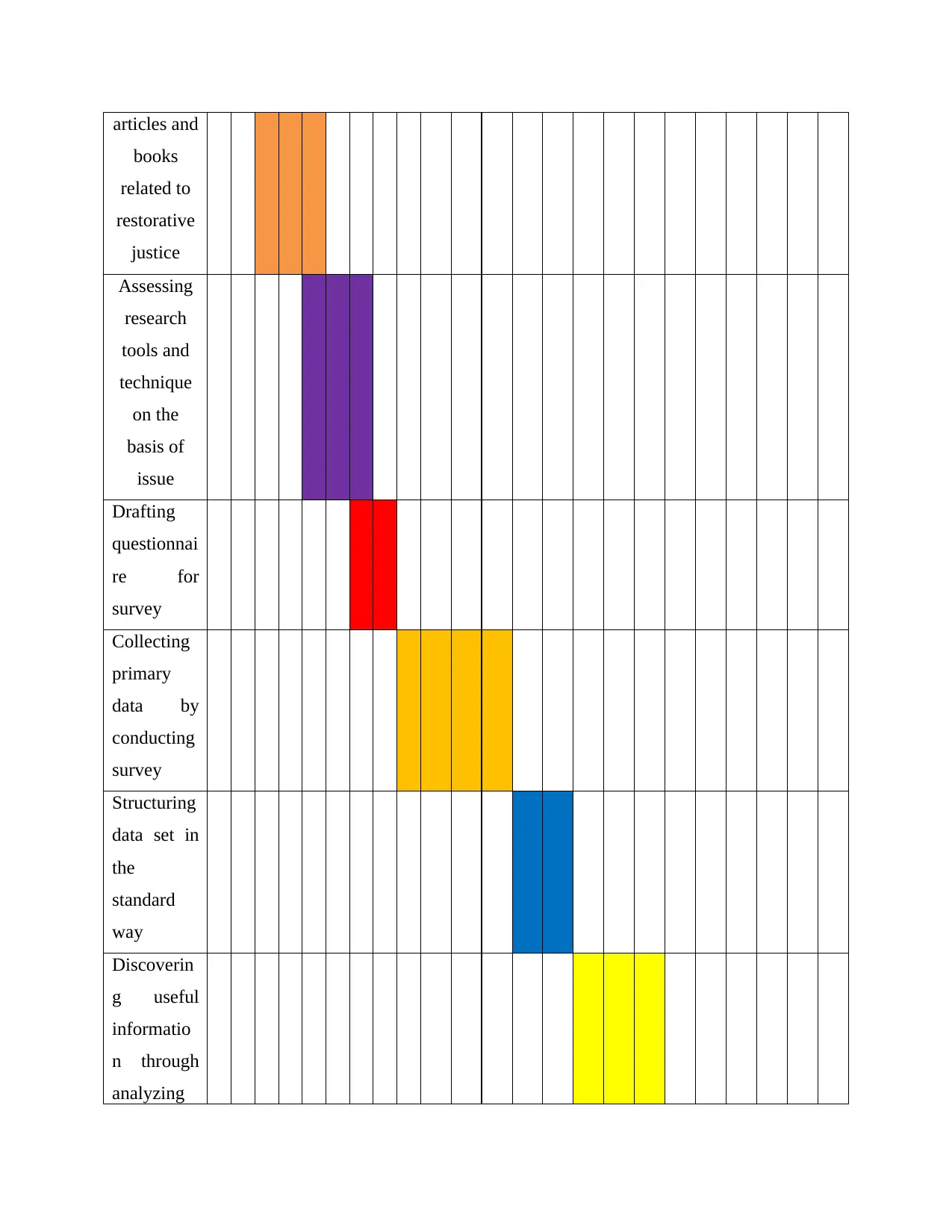
articles and
books
related to
restorative
justice
Assessing
research
tools and
technique
on the
basis of
issue
Drafting
questionnai
re for
survey
Collecting
primary
data by
conducting
survey
Structuring
data set in
the
standard
way
Discoverin
g useful
informatio
n through
analyzing
books
related to
restorative
justice
Assessing
research
tools and
technique
on the
basis of
issue
Drafting
questionnai
re for
survey
Collecting
primary
data by
conducting
survey
Structuring
data set in
the
standard
way
Discoverin
g useful
informatio
n through
analyzing
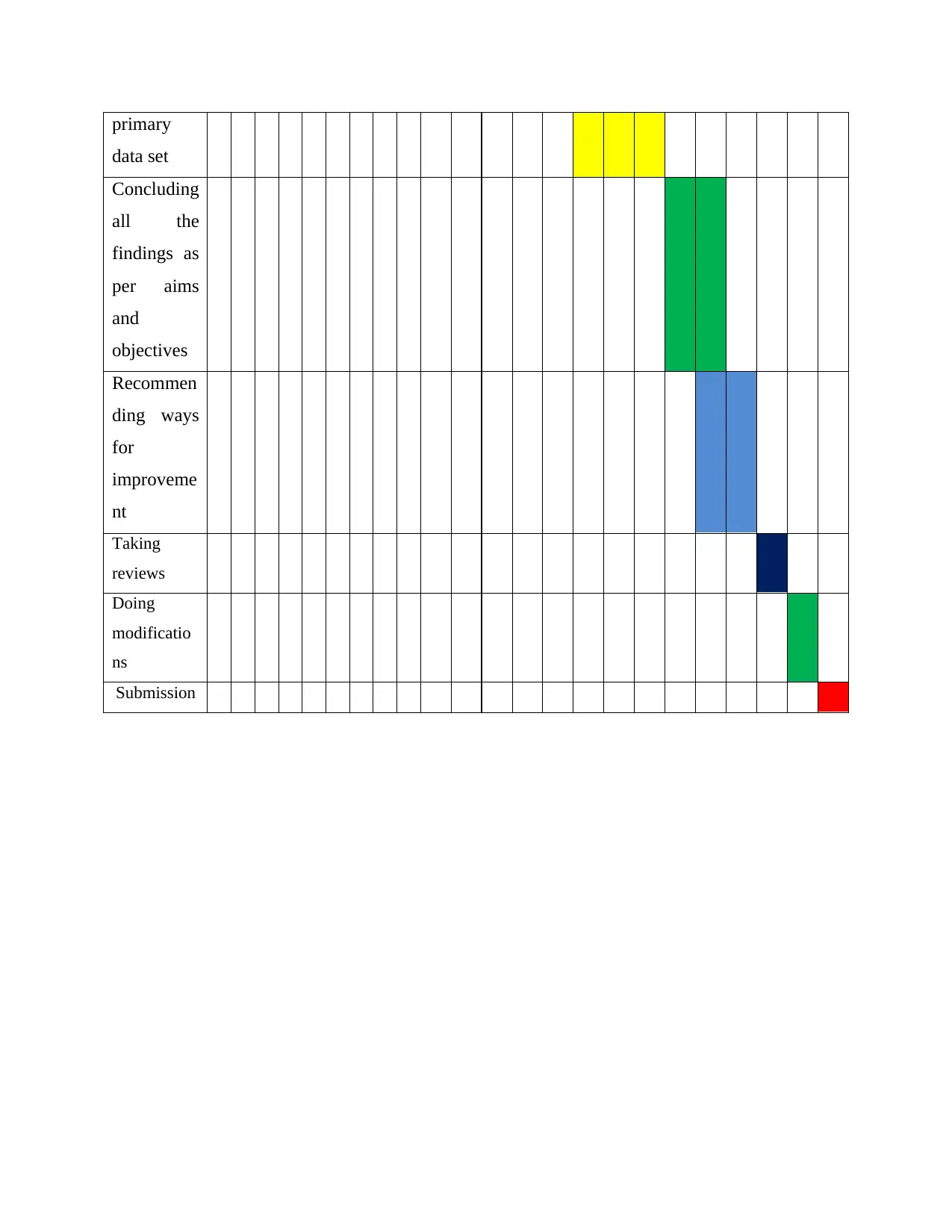
primary
data set
Concluding
all the
findings as
per aims
and
objectives
Recommen
ding ways
for
improveme
nt
Taking
reviews
Doing
modificatio
ns
Submission
data set
Concluding
all the
findings as
per aims
and
objectives
Recommen
ding ways
for
improveme
nt
Taking
reviews
Doing
modificatio
ns
Submission
Secure Best Marks with AI Grader
Need help grading? Try our AI Grader for instant feedback on your assignments.
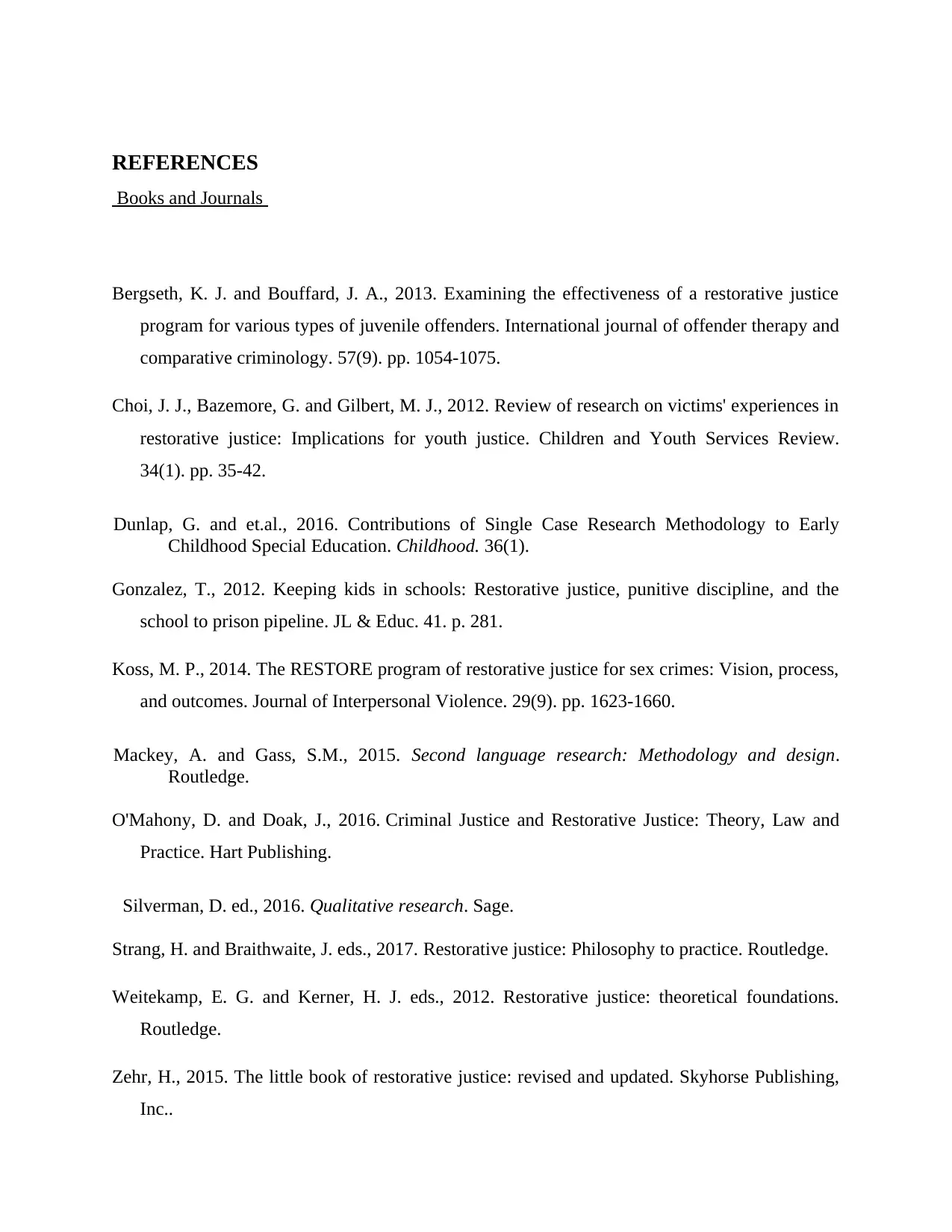
REFERENCES
Books and Journals
Bergseth, K. J. and Bouffard, J. A., 2013. Examining the effectiveness of a restorative justice
program for various types of juvenile offenders. International journal of offender therapy and
comparative criminology. 57(9). pp. 1054-1075.
Choi, J. J., Bazemore, G. and Gilbert, M. J., 2012. Review of research on victims' experiences in
restorative justice: Implications for youth justice. Children and Youth Services Review.
34(1). pp. 35-42.
Dunlap, G. and et.al., 2016. Contributions of Single Case Research Methodology to Early
Childhood Special Education. Childhood. 36(1).
Gonzalez, T., 2012. Keeping kids in schools: Restorative justice, punitive discipline, and the
school to prison pipeline. JL & Educ. 41. p. 281.
Koss, M. P., 2014. The RESTORE program of restorative justice for sex crimes: Vision, process,
and outcomes. Journal of Interpersonal Violence. 29(9). pp. 1623-1660.
Mackey, A. and Gass, S.M., 2015. Second language research: Methodology and design.
Routledge.
O'Mahony, D. and Doak, J., 2016. Criminal Justice and Restorative Justice: Theory, Law and
Practice. Hart Publishing.
Silverman, D. ed., 2016. Qualitative research. Sage.
Strang, H. and Braithwaite, J. eds., 2017. Restorative justice: Philosophy to practice. Routledge.
Weitekamp, E. G. and Kerner, H. J. eds., 2012. Restorative justice: theoretical foundations.
Routledge.
Zehr, H., 2015. The little book of restorative justice: revised and updated. Skyhorse Publishing,
Inc..
Books and Journals
Bergseth, K. J. and Bouffard, J. A., 2013. Examining the effectiveness of a restorative justice
program for various types of juvenile offenders. International journal of offender therapy and
comparative criminology. 57(9). pp. 1054-1075.
Choi, J. J., Bazemore, G. and Gilbert, M. J., 2012. Review of research on victims' experiences in
restorative justice: Implications for youth justice. Children and Youth Services Review.
34(1). pp. 35-42.
Dunlap, G. and et.al., 2016. Contributions of Single Case Research Methodology to Early
Childhood Special Education. Childhood. 36(1).
Gonzalez, T., 2012. Keeping kids in schools: Restorative justice, punitive discipline, and the
school to prison pipeline. JL & Educ. 41. p. 281.
Koss, M. P., 2014. The RESTORE program of restorative justice for sex crimes: Vision, process,
and outcomes. Journal of Interpersonal Violence. 29(9). pp. 1623-1660.
Mackey, A. and Gass, S.M., 2015. Second language research: Methodology and design.
Routledge.
O'Mahony, D. and Doak, J., 2016. Criminal Justice and Restorative Justice: Theory, Law and
Practice. Hart Publishing.
Silverman, D. ed., 2016. Qualitative research. Sage.
Strang, H. and Braithwaite, J. eds., 2017. Restorative justice: Philosophy to practice. Routledge.
Weitekamp, E. G. and Kerner, H. J. eds., 2012. Restorative justice: theoretical foundations.
Routledge.
Zehr, H., 2015. The little book of restorative justice: revised and updated. Skyhorse Publishing,
Inc..
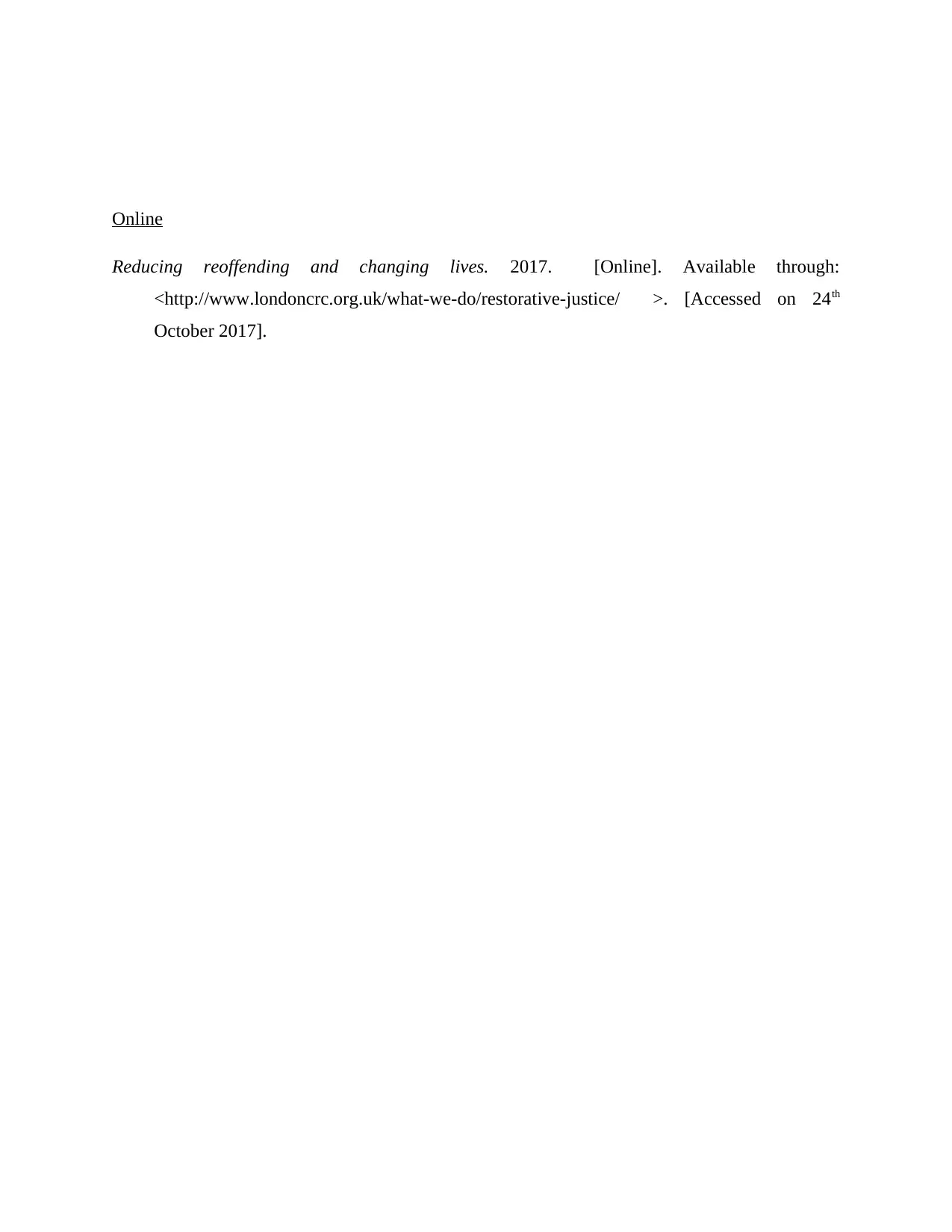
Online
Reducing reoffending and changing lives. 2017. [Online]. Available through:
<http://www.londoncrc.org.uk/what-we-do/restorative-justice/ >. [Accessed on 24th
October 2017].
Reducing reoffending and changing lives. 2017. [Online]. Available through:
<http://www.londoncrc.org.uk/what-we-do/restorative-justice/ >. [Accessed on 24th
October 2017].
1 out of 12
Your All-in-One AI-Powered Toolkit for Academic Success.
+13062052269
info@desklib.com
Available 24*7 on WhatsApp / Email
![[object Object]](/_next/static/media/star-bottom.7253800d.svg)
Unlock your academic potential
© 2024 | Zucol Services PVT LTD | All rights reserved.



